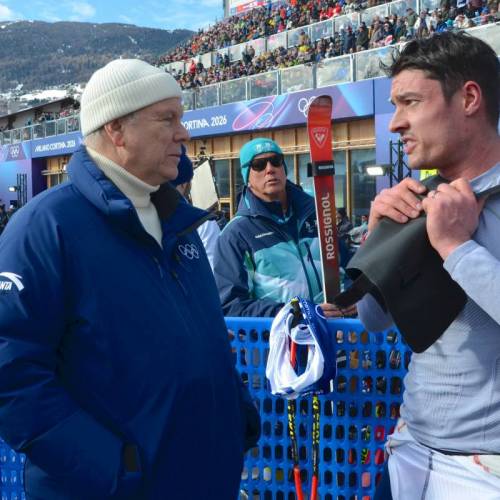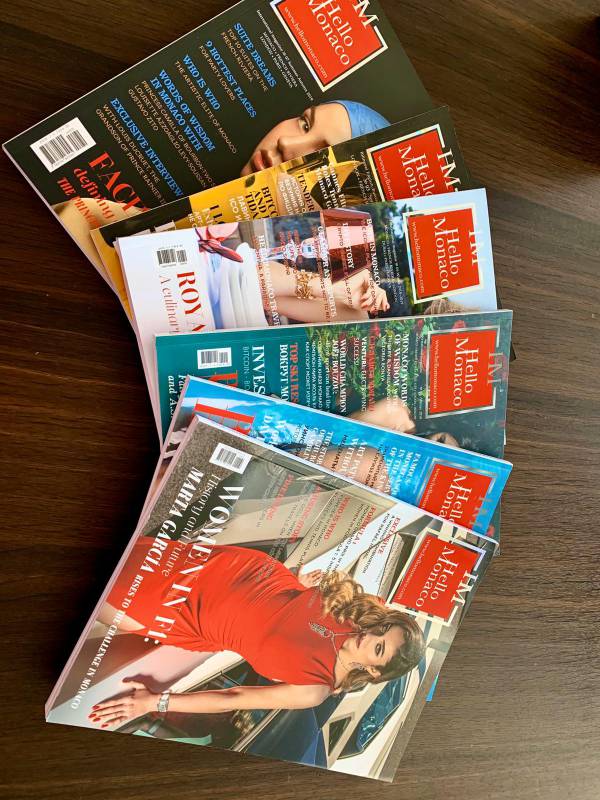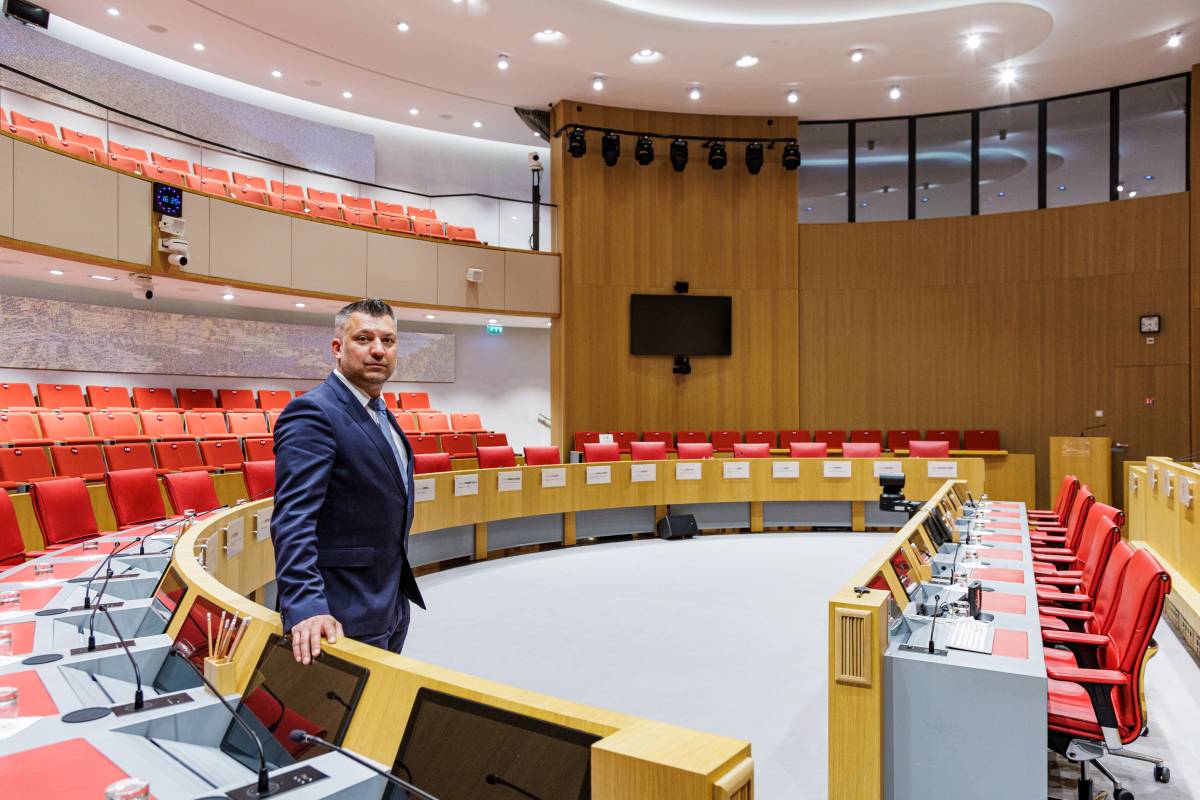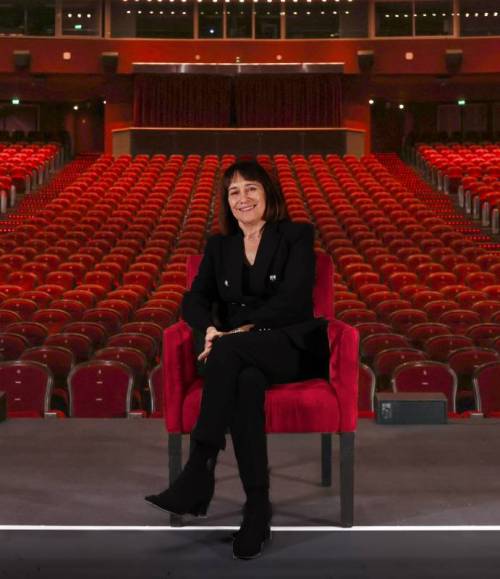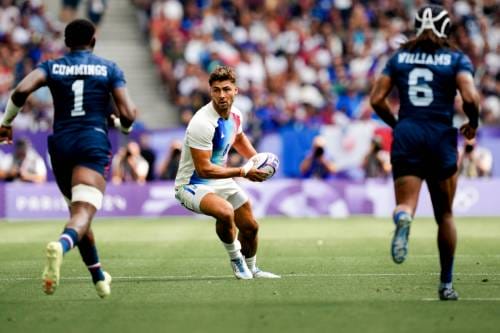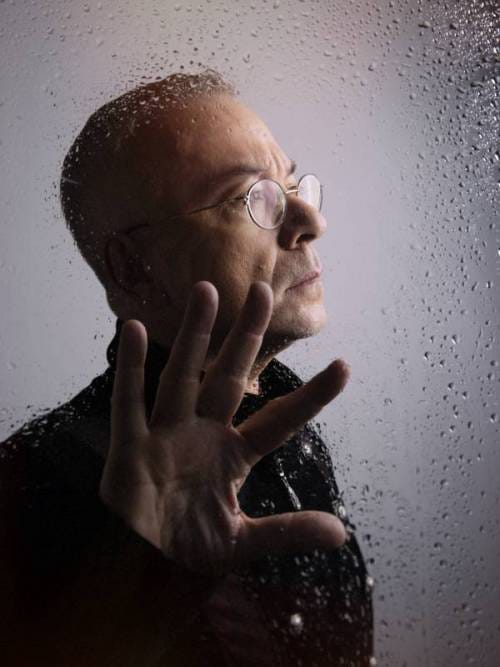As President of the National Council, Thomas Brezzo plays a key role in shaping Monaco’s policies and representing the concerns of its residents. From the grey list challenges to housing, healthcare, and the evolving business landscape, he discusses the priorities and practical steps needed to ensure Monaco stays competitive and secure. In this interview, Brezzo offers candid insights into the work ahead and how the National Council is addressing some of Monaco’s most pressing issues.
HelloMonaco: This is a sensitive topic—everyone wants to talk about it. In one interview you said there was a serious warning. What specific weakness do you think contributed most to this decision to include Monaco in the grey list?
Thomas Brezzo: Yes, it’s clear that the main weakness was the government’s slow adaptation of international standards into Monaco’s legislation. When I was elected in 2018 and became president of the Legislation Committee, I had to translate the fourth European directive into local law—we were already 18 months behind, and Monaco risked being grey-listed then. I completed that in a few months.
Since 2018, we have voted on 16 laws relating directly or indirectly to money laundering. However, because of these delays, many professionals in Monaco hadn’t yet adapted to these requirements, which created compliance gaps. While the banking sector was better prepared—since they’re used to international AML obligations—other sectors needed to catch up quickly.
This lag meant that when international bodies like the FATF and MONEYVAL reviewed Monaco, they imposed stricter requirements and greater responsibility on compliance officers. Now, opening a bank account here can be harder than in other countries because of these obligations.
Frankly, I believe the government took too long, too lightly. I had been advising them to reform the SICCFIN into an independent authority, as recommended internationally, but they kept delaying.
Eventually, we were forced to act in 2023 and create a truly independent authority to become the Autorité Monégasque de Sécurité Financière (AMSF). The National Council, for its part, has complied fully with international standards. MONEYVAL has even commended us for this work, which was done in a short period and in close collaboration with the government’s legal teams.
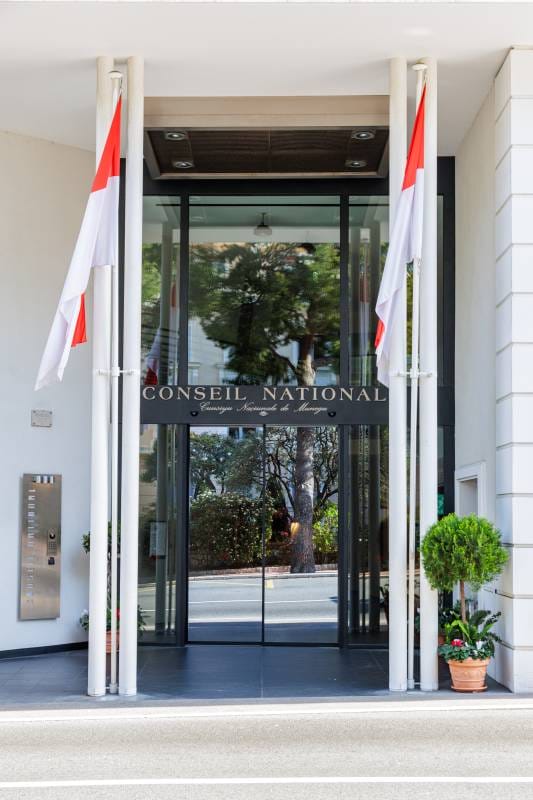
HelloMonaco: Monaco is in the grey list, actually it’s not the first time, right?
Thomas Brezzo: Yes, but it’s not the same list as before. The international pressure today is far greater than it was in 2009. End of March, I spoke with my Luxembourg counterpart at the European Conference of Presidents of Parliament. Luxembourg was also on the grey list in 2009, but they took it seriously and quickly adapted their laws to international standards. Since then, they’ve consistently kept up with new requirements and evaluations.
The challenge in combatting money laundering is that criminals evolve their tactics as soon as the rules change. International organizations must constantly update their evaluations to stay ahead. Luxembourg understood this early on and has kept pace. In Monaco, we didn’t adapt as quickly.
The MONEYVAL evaluation has two parts: first, whether the legislation aligns with standards (which in Monaco’s case it does), and second, whether those standards are applied effectively in practice. Here, we fell short because implementation lagged. Despite passing laws in 2018, there were delays in setting up the bodies needed to enforce sanctions. In a small country like Monaco, this was further complicated by reluctance to impose sanctions on known professionals.
If we don’t meet the required statistics on sanctions and enforcement, we’re deemed non-compliant and evaluated poorly. That’s exactly what happened. Monaco began addressing these issues only once we knew the MONEYVAL evaluation was coming, which left us with just a few months to prepare—far too little time.
For example, we passed a law in 2018 creating a commission (the CERC) to oversee complaints and impose sanctions. Yet, it took two years before anyone was appointed to actually enforce those sanctions. In a small country like ours, where everyone knows each other, there was little willingness to take on this sensitive role.
Without proper sanctions, people continue to operate as they please, and the system doesn’t meet international standards—hence our grey-listing. Now we’re playing catch-up. There’s been a surge of information and guidance for professionals in Monaco, and the mindset is finally shifting. People now understand the need for transparency and for knowing the origin of funds. It’s been a rapid and intense process—almost a shock—but it’s leading to real change.
HelloMonaco: Can you name on a bigger scale what you need to do now, personally, as President of the National Council, in order to be excluded from the grey list?
Thomas Brezzo: Now we have to catch up with implementing the necessary formalities in Monaco. As a legislative body, the National Council’s role is to propose laws, not to enforce them directly.
That’s why in December we proposed legislation to streamline criminal proceedings: if someone admits guilt, they can avoid a full trial, which accelerates the process.
We also introduced a system for negotiating with the justice system in financial cases, similar to a plea deal. Here, the individual can agree to sanctions even without admitting guilt, which helps authorities impose confiscations and improve statistics for MONEYVAL. This approach is essential for Monaco to leave the grey list.
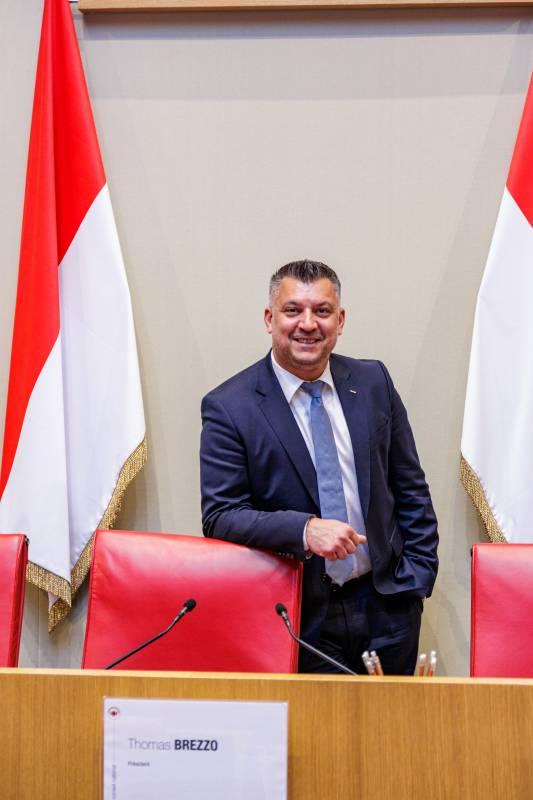
HelloMonaco: So, it’s a bit like the US model?
Thomas Brezzo: Yes, this kind of plea deal exists in the US, Italy, France—almost everywhere. In Monaco, we didn’t need it before because justice here was swift, so there was no urgency to update the process. But with these financial offenses, investigations often involve multiple countries.
Monaco can’t investigate abroad directly; it has to rely on foreign judges, which slows things down. That’s why we’re proposing changes to speed up proceedings and deliver quicker results.
HelloMonaco: So it’s not just a question of legislation?
Thomas Brezzo: Exactly. Our legislation is now fully compliant. The next step is to wait for any new international standards and adapt as needed. For now, there’s nothing more to do legislatively. What we can do—and have done—is put pressure on the government during budget negotiations to increase resources for the anti-money laundering authority (AMSF). Two years ago, there were only 12 staff; now, there are about 70.
We’ve also pushed for tailored guidance for each profession covered by anti-money laundering rules—bankers, notaries, financial activities, and even car dealerships, among 25 identified professions.
HelloMonaco: So these businesses are directly affected by the grey-listing?
Thomas Brezzo: For professionals, absolutely. They’re now facing many new compliance obligations, and that means hiring staff just for compliance—adding a financial and operational burden. The National Council’s role is to pressure the government to support these professionals in meeting their obligations.
For residents and those with bank accounts here, the impact is limited because the banks—BNP, Société Générale, and others—are already used to applying these standards. But the grey list does mean more scrutiny: for instance, when making international transfers, individuals now have to provide more information. So far, I haven’t heard of transactions being refused solely because of the grey list, but there is definitely more red tape.
HelloMonaco: You are very optimistic about excluding Monaco from the grey list.
Thomas Brezzo: I am, yes, for sure. I’ve been working on these issues for years and anticipated all these points. When we voted on money laundering laws and even during the 2018 budget discussions, I warned that if we didn’t act, we would end up on the grey list. The government said, “No, no, we have time,” but now here we are. So for me, it’s no surprise at all. But, yes, I am very optimistic!
HelloMonaco: Let’s turn to your leadership style and broader role. How would you describe your leadership approach?
Thomas Brezzo: I believe in leading by example, not by instruction. If people see you actively solving problems, they’ll want to help. That’s how I was raised and how I operate as a lawyer. I rarely ask others to do something I wouldn’t do myself. My background as a lawyer and former head of the Legislation Committee also gives me a technical advantage that previous presidents didn’t necessarily have.
HelloMonaco: What are your main priorities as President of the National Council, beyond the grey list?
Thomas Brezzo: Healthcare is the top concern for Monegasques. Our system is good, but we need to keep it strong and attract top doctors from abroad. Other important areas are security, traffic, property, and making Monaco more attractive for businesses. That’s why we’ve recently modernized company laws and plan to update four more in the coming years. People need confidence in the legal framework if they’re going to do business here.
Housing is another critical issue. Rents are so high that without government-supported housing, many Monegasques couldn’t afford to live here. For years, housing wasn’t a focus of the National Council, so we’re catching up now, pushing the government to build 80–100 apartments each year.
HelloMonaco: Where will you build these new apartments?
Thomas Brezzo: Several sites have been secured: Bel Air, near the hospital, with about 200 apartments by 2027; the Exotic Garden area, with 76-90 units; Boulevard du Larvotto; and rue Louis Auréglia. These projects are part of a housing plan initiated by the Prince in 2019, but we’re urging the government to review it and plan better for the future. For example, there’s an area where a college has been set for demolition for 15 years, but no decision has been made on its redevelopment.
HelloMonaco: What about traffic?
Thomas Brezzo: Yes. Traffic is a political challenge because elected officials often think in five-year cycles, but traffic solutions require 15–20-year planning. We’re advocating for a subway linking Nice to Ventimiglia to bring in workers. By 2050, Monaco will need 100,000 workers daily. Road expansion alone won’t meet that need. Collaborating with France and Italy on this is essential—not only for Monaco’s economy but also for the broader region.
We also need to remember that Monaco is only two square kilometres, hosting major events like the Yacht Show and the Grand Prix within that tiny space. Unlike places like Miami or Cannes, which have more room for such shows, we have to fit everything into this compact area. We know traffic is a problem during these events, but they’re essential to Monaco’s attractiveness—so we have to accept some inconvenience.
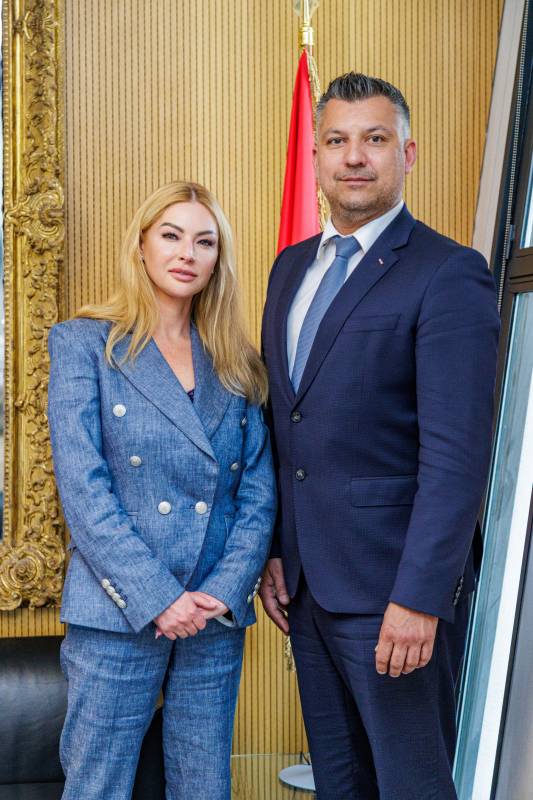
HelloMonaco: What’s going on with the taxi situation in Monaco?
Thomas Brezzo: My cousin is actually the president of the taxi association, so I’m well aware of the situation. The main demand for taxis is from April to June; outside of those months, there’s little work, so it’s hard to sustain a larger taxi fleet year-round. That’s why we supported introducing “white taxis” and asked the government to expand the number of authorizations—28 today isn’t enough.
HelloMonaco: What about allowing French taxis during the high season. Is that a solution?
Thomas Brezzo: No, we’re firmly against that. Only taxis authorized by Monaco should operate here. If we let French taxis work here, it would undermine the whole licensing system that we fought to keep during negotiations with the EU. If we open the door for foreign taxis, it sets a precedent: next, it would be foreign lawyers, doctors, and other professionals. Monegasques would be pushed out by wealthier foreign companies, rents would skyrocket, and our young people would have no future here. If there’s no Monegasque population, there’s no Monaco.
HelloMonaco: Many newer residents of Monaco expect the same level of services they get elsewhere and come for tax reasons.
Thomas Brezzo: That’s true. As a former consultant and lawyer, I’ve helped many people set up companies and obtain residency in Monaco. The demand for better, faster service is real—residency cards now take four to six months, company authorizations three to four months. In places like Dubai, you get these in a week. But we can’t just copy that here. We do thorough checks to ensure people coming to Monaco aren’t linked to criminal activities, because security is paramount.
It drives me crazy that setting up a company still takes two to three months. The law we just passed reduced the maximum delay for company authorizations from three months to a month and a half— a real step forward. But residency is still slow, not because of laws, but because of the administrative system, which we can’t directly control. All we can do is put pressure on the government to act faster.
It’s not just about company authorizations. You also need quick access to tax numbers for invoicing and to employment numbers so you can hire staff. Previously, it could take a month just to get that employment number—completely unacceptable. We’re working on solutions and hope that by the end of this year, there will be real progress in streamlining these processes.
Still, we must be more efficient. When I started my professional activity, getting a residency card took about six weeks. Now, with digitalization efforts, it takes even longer—up to six months. We invested €700 million in digitalization eight years ago, yet we haven’t seen real improvements. That’s why we’re pushing the government to act: to maintain Monaco’s security and its attractiveness.
Attractiveness also means supporting services like schools. We recently expanded space for the International School of Monaco and I’m working with Mr. Muller at the University of Monaco to secure a new 5,000-square-metre facility. The current 3,000-square-metre space isn’t practical for a world-class university. Better facilities will help attract families to Monaco, because if people move here, they need good schools for their children.
HelloMonaco: Monaco is a top destination, with security, climate, tax advantages, and a prime European location. But places like Dubai are also booming as tax havens. How does Monaco’s tax-free system compare?
Thomas Brezzo: The main advantage of Monaco is its proximity to the rest of Europe—you can be in Paris or Germany in an hour. Dubai is more remote. Monaco also has a long history of institutional stability and respect for human rights, which is not always the case in Dubai. Plus, Monaco is closely monitored by international organizations, ensuring a secure and transparent environment for long-term investment.
While Dubai offers great infrastructure, weather, and lifestyle, it’s farther from family ties in Europe. And from a credibility standpoint, doing business from Monaco carries more weight than from Dubai. That’s why, for many, Monaco is still the safer, more secure.

